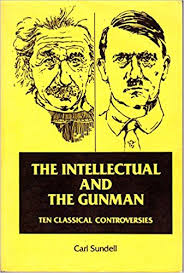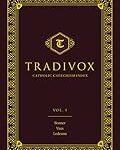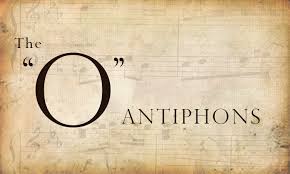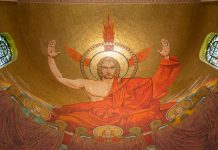What Christ said of the poor might be said of intellectuals: they will always be with us. Then the question naturally arises: in what ways are we fortunate, or unfortunate, that this is so?
The Role of the Intellectual
If there is a mark of distinction for authentic intellectuals, it is the one identified by Dietrich von Hildebrand: The truthful person recognizes a solemnity in every assertion. He grasps that in everything he utters, he is called to bear witness to the truth. The thinker’s role is primarily positive, though to many it seems negative. His startling widespread appearance on the cultural scene is often concurrent with the breakdown of comfortable, longstanding traditions which are losing their strength or have outlived their usefulness. Initially, his role is destructive, for he must lay to rest old beliefs in order to establish new ones. He must communicate to others, as Euripides noted, a judicious sense of what not to believe. Socrates was hated because he questioned even the existence of the gods, never mind the scandalous behavior of Zeus and his Olympian tribe. Jesus, whose vocation was to save the world, was crucified for his trouble. Nietzsche, perhaps one of the most irritating gadflies of the modern world, believed that a thinker ought to be found troublesome, rather than agreeable, or he has not fulfilled his mission.
Without intellectuals to discover and frame attractively those truths by which a society is guided toward sanity in things as they are and as they ought to be, all is lost. But philosophers dare not presume they can achieve great things by their own force and momentum. Their cool and dispassionate judgment must radiate to the public at large and infect them with a respect for truth, for there are no great intellectuals without great audiences. It helps the thinker to have a touch of the poet to showcase his ideas to their best advantage. Thus Socrates is remembered for his powerful ironies and Jesus for his picturesque parables; but an unthinking race will not even rise to the level of Aesop’s simple fables.
In the Academy
The intellectual is most at home in the academy. It is imperative, therefore, that the intellectual in the classroom take not the stance of the warrior for truth so much as the apologist. The thinker without a sense of humor is done for, as it is by this tickling of other people’s sensibilities that the utterance of many an uncomfortable truth, if found objectionable, is tolerated and forgiven. If the civilized tone of speech and manner is cultivated, it is remarkable how swiftly and sincerely the young will rise to the occasion and be transformed into zealous guardians of civilization.
The highest value of the intellectual in the academy is his capacity for knowing how to guide the young toward that most critical of intellectual powers – judgment – which discriminates the important from the unimportant and detects those general principles that govern the particulars of experience. Having acquired the skill for lifelong self-instruction, the veteran intellectual is able to bestow upon the novice the knowledge and wisdom of the past, the sudden loss of which could reduce the human race in one generation to the condition of those brutish tribes still inhabiting the remote jungle recesses of the world. Contrary to the sneers of the anti-intellectual, the thinker performs the most eminently practical of all services to humanity; he is the main prop and defender of the doctrine, which requires belief in transcendence, that moving from barbarism to enlightenment is not only possible, but necessary. Indeed, without the rise of the thinking class among our primitive ancestors, it may well be asked: which species today would rule the planet?
The success of intellectual instruction depends on the material with which the intellectual has to work. Sages have cautioned that you can send the child to college but you cannot make him think. Our tragedy today is that the nearly total rebellion against folk wisdom has produced a generation of parents no longer able to communicate, and in fact more than ever before really afraid to transmit, basic values to their children. Young men and women entering college sail the sea of life with no compass, nor even a fledgling interest in the stars. This may in part be the reason for the general malaise among college students today, their reluctance to make the leap from ignorance to wisdom, and indeed their unwillingness to believe that their professors know any more than they do.
The Problem of Power
For the intellectual to will to truth is greater than the will to power, or is it? If the intellectual has knowledge and insight others have not, has the the power as far as the world is concerned or only in so far as he is concerned? Is he able by his special knowledge and even wisdom to bring others, even the anti-intellectuals, to their very knees? The authority of truth is great in human affairs, and it is certain that people who live illusory lives are those soonest to be stripped of power in their dealings with others. It is therefore ironic that illusions, sincerely and steadfastly avoided, should yet prevail even among intellectuals.
For example, Plato surveyed the pitiable state of mankind and judged that the world would not be put right until philosophers were made kings or kings were made philosophers. That Plato was the consummate intellectual no one denies (though Jefferson found him much overrated). Questions have been raised about Plato’s family background, his aristocratic affiliations, and his dislike for Athenian democracy. So far as we can tell he suffered the frustration of intellectuals throughout history – in particular that anxiety of the intellect which has experienced visions of utopia, then awakens and recoils from the touch of feeble and flawed humanity. Plato wished to give philosopher absolute power to create, to govern, to damn, to reddem. Thus in all times and everywhere the intellectual in the Platonic tradition has been eyed suspiciously as one who had a game of his own to wiu; whose strategy, secret and lofty, had to be countered with common wiles, and, where necessary, the use of force. Socrates was poisoned, Aristotle chased out of Athens, Jesus crucified, Galileo muzzled, Marx exiled, and Trotsky murdered.
Let us call the founder of a utopia by the name Someone. Since it is true that one man’s utopia is another man’s hell, Someone can only create utopia by force, by oppression, by obliteration of all other visions and visionaries. So that this Someone must protect and advance his utopia with an army of patriots. But nothing more quickly confuses and corrupts Someone than the sudden attainment of enormous power. As Arthur Crock puts it, “you can’t build a utopia without terror, and before long, terror is all that is left.” This was the clever insight of Frederick the Great: wanting to punish one of his provinces, he sent a philosopher to govern it.
We live in an age of behavioural psychology for a reason. Someone needs to manage our behaviour in order to establish utopia. Hence the emergence of a class of behavioural engineers. A vast army of disciplined civil workers and bureaucrats is needed to organize a society that runs efficiently and obediently (though not necessarily smoothly). Indeed, the lower echelons of society may be kept in ignorance and confusion as to what is going on, so long as they are kept pacifies with the usual bread and circus distractions. Federal control of public education through federal funds will help to design and enforce the blueprint for utopia. Socialism will see to it that the young will trade unpredictable and dangerous freedom for security, peace, and the routine of self indulgence both for the body and (what is left of it) the soul. To a significant degree this effort has taken hold on college campuses today, where students cuddle in safe spaces, and come forth only to demand control of the curriculum, loudly boycott professors with whom they disagree, and terrorize cajole presidents into submission, all in the name of Someone’s “progressive” utopian fantasy.
Ironically, a true utopian society has already been created, though today it is vilified as the least worthy of all possible utopias. I speak of the American Constitution and the Bill of Rights. Recognizing that all humans are flawed creatures, this utopia begins with the premise that perfection cannot be imposed upon others; that it must originate, to the degree that it can, from within each person. The intellectual Founders agreed that ideal freedom and rights should be available to all, the freedom to fail as well as the freedom to succeed, as the foundation of the best of all possible worlds. Citizens are not to be guaranteed happiness, but rather freedom from a government which might restrain the pursuit of happiness. This freedom philosophy obliges us to admit that we cannot live with our heads in the exhilarating clouds of idealism without tripping now and then on the rocky roads of reality. Though well intentioned, those who would remove every rock from our path will do us no favor; we would sink into the smooth sands of satisfaction and atrophy. What remains for us is to seek the kind of world large enough to encompass the broadest spectrum of human needs and wants; to create a society which is surely not perfect, but in which everyone will be enabled to seek his own fulfillment in his own way and in his own time. The true intellectual may be kept busy enough by the contributions he has to make toward that end.
The Shame of the Intellectuals
The 18th and 19th centuries saw the downward spiral of religion throughout the Western World. A new priesthood emerged: the philosophers and scientists, who set reason against faith, but offered no explanation of man’s ultimate end nor any guidance for his morals other than Rousseau famous dictum: “Freedom is obedience to the law one has laid down for oneself.” The world has always suffered from the intellectual who brings disgrace to his calling, who deliberately twists facts and words to advance himself personally by acquiring notoriety and the material and social advantages which accompany fame. Why this betrayal of the intellectual priesthood is more common in some ages than in others it is difficult to say. Surely the vacuum created by collapsing religion partially explains the phenomenon. Perhaps a surplus of mental workers creates a surplus of theories which at first amuse, then amaze, and finally corrupt the public sensibility. This provides the authentic intellectual with yet another herculean task: the identification and weeding out of those prolific theorists who seem bent on making their mark through intellectual fame or infamy.
The Roman writer Terence complained of a ceaseless demand for men who were clever at making wrong appear right. Now moral relativism is immoral, for relativism promotes an indecisive state of mind; and while men are undecided as to how tolerant they must be, many crimes are allowed and go unpunished due to lack of consensus. The intellectual who offers himself to any party in the game of politics does so at great risk to his capacity for independent thought. The classic case of how a culture runs amok within a single generation and becomes the scourge of the planet occurred in Germany between the two World Wars. The Weimar Republic was a short-lived attempt by the German people to adopt the principles of liberalism so dominant in the West. The experiment did not take. The intellectuals abandoned restrained liberalism in favor of unrestrained libertinism.
According to Richard Grunberger, during the Weimar Republic’s tenure Germany relaxed all standards of censorship, the rate of abortion and prostitution increased radically, schools introduced sex education into their curriculum, parental authority was scorned, Berlin exploded with sexual promiscuity of every type, Marxism flourished, the penal code lost its force, government bureaucracy grew to staggering proportions, and the tax burder decimated the middle class. Unable to handle newfound freedoms with intelligent restraint, a scapegoat for the deteriorating economic situation had to be found. As early as 1921 Moeller van den Bruck announced the culprit: “Our scorn must be reserved for the intellectuals who have persuaded the German people to this folly.”
Intellectuals and Gunmen
Folly it truly was. Franz Werfel, looking back during World War II on the intellectual and artistic atmosphere of the Weimar Republic, regretted the cultural excesses of the era. “There is no more consuming, impudent, mocking, more devil-possessed arrogance than that of the avant-garde artist and radical intellectual who are bursting with the vain hankering to be deep and obscure and difficult and to inflict pain. To the accompaniment of the amusedly indignant laughter of a few philistines we inconspicuously heated up the hell in which mankind is now frying.”
Hitler early on as dictator mounted his crusade against intellect. Einstein, the iconic Jewish intellectual of his day, having read the handwriting on the wall, immediately fled Germany. Echoing Rousseau’s charge that a thinking man is a depraved animal, Hitler, saw in rationalism the seed of its own demise and commented: “Universal education is the most corroding and disintegrating poison that liberalism has invented for its own destruction…. A violently active, dominating, intrepid, brutal youth – that is what I am after… I will have no intellectual training. Knowledge is ruin to my young men…. A Victor will never be asked if he told the truth.” Since Hitler believed that intellect sabotaged instinct, it had to be crushed. Further, he was convinced that a nation had to be deceived in order to be governed (all the more reason for suppressing rational thought). By 1938 Hitler’s contempt for intellectuals was bizarrely articulated in a speech to the German press: “Unfortunately we need them [intellectuals]; otherwise we might, I don’t know, exterminate them or something like that. But unfortunately we need them.”
Artists and intellectuals at once fell in line behind Hitler. The Nazi poet Hans Johst delivered his immortal line: “When I hear the word ‘culture,’ I slip back the safety-catch of my revolver.” The more democratic members of the intellectual class were relatively indifferent to the violent reaction setting in against rational liberalism. Perhaps they were fearful too, for since the days of Bismarck, intellectuals and artists had been taught that their livelihood depended on the whim of the prevailing political masters. Many of the teaching profession, whose material fortunes had declined during the Weimar Republic, hoped that riding Hitler’s coattails to power would restore their lost status. They hoped in vain, even though ninety-seven percent of the teachers joined the Nazi Teacher’s Association. Karl Fischer, the popular school teacher who inaugurated the Nazi youth movement, was addressed by his students as ‘Der Fuhrer’. According to Grunberger, by 1931 support for Nazism at the universities was proportionately twice as among the general population; 300 university professors signed a manifesto urging the voters to elect Hitler in 1933. Professors developed secret files on their colleagues, and students rated their professors positively or negatively according to the latters’ party loyalty. Examinations were made easier in order to insure the issuance of the necessary volume of diplomas. On one examination of 179 students, ninety-four had spelled proper names without capital letters and eighty one had been unable to spell correctly the name of Goethe, Germany’s foremost poet. With typical Nazi arrogance, private church schools were closed and re-opened as state schools, and an attempt was made to remove religion from the curriculum. The Nazi Teacher’s Association even requested its members to discontinue their religious affiliation.
The shattering blow to authentic education came with the submission of all schools to the federal Department of Education in Berlin, which controlled instructional methods, curricula, faculty pay, and teacher certification. The Nazi strategy was successful in conquering the minds of the young by diminishing the traditional and modifying influence of parents, teachers, and the clergy. Hitler achieved the same goals set by Stalin for the Russian people: a monopoly of power over the masses by concentrated techniques of propaganda which serve to reinforce the legitimacy of the Fuhrer’s power. Thus was Jefferson’s difficult saying vindicated: no education is better than a bad one; for it is easier to find the truth on one’s own than to unlearn a thousand lies.
Hitler’s assault upon intellect was bound to be his own undoing. Whatever the sins of the intellectuals had been, the advocacy of illiteracy was not one of them. When Hitler geared up for world plunder he had to recruit as warriors those same pupils whose education had been guided by his own dictum: “Knowledge is ruin to my young men.” Thus, many young men seeking army officer commissions were hopelessly ignorant of fundamental knowledge.
Can Intellectuals Be Democrats?
The intellectual fancies himself a monarch of the mind. Therefore, when inhabiting a democracy, he may seem to others, and even to himself, a king without a country. He is suspect everywhere because he is not understood, and when he opens his mouth to speak with assumed authority it is regarded as an impertinence. Again, we listen to Schopenhauer, who studied so well the role of intellect in human affairs.
So you will see that in dealing fools and blockheads, there is only one way of showing your intelligence – by having nothing to do with them. That means, of course, that when you go into society, you may now and then feel like a good dancer who gets invited to a ball, and on arriving finds that everyone is lame – with whom is he to dance?
The problem for the intellectual is that he cannot reach the masses; and even if he could, he could only with the greatest difficulty and good luck inspire them with his own passion for truth. The intellectual is disheartened by his minority status in most societies, but in a democracy he may easily despair of serving any useful purpose. Yet his function is most vital to a free people; for notice how tyrants, when they wish to terrorize the masses, begin by corrupting the educational process and attacking true intellectuals at the same time elevating the impostors. In fact, it is precisely because he is seemingly ignored in a democracy that the intellectual is able to function without interference. While he supposes himself to be ineffectual, the contrary may be so; in the most indirect and inconspicuous ways his ideas may drift out among the people and take on a career of their own as the bricks and mortar which are used to build the common man’s house of intellect. A man of intellect sits in a room full of democrats, and while they are discussing a shared problem, says something insightful that startles everyone for its clarity and beauty of expression. The sentence is taken out of the room and is picked up in the newspapers and becomes a staple of collected wisdom. How often has this scene been enacted; how many unsung intellectual champions have made their mark on the world? And will we ever know whether, on balance, their collective contribution to society is even greater that that of their more celebrated contemporaries in other walks of life?
In any case, democracy by its nature is a system that flies in many directions at once, which needs a sense of coherence and purpose. The role of the intellectual is to hold society together by presenting, at least to those who are educable, an image of collective self, a sense of human worth, and a conviction of eternal verities. Most significantly, the authentic intellectual serves a democracy by maintaining constant vigilance over the patterns of social behavior and by alerting the public, when he can screw up the courage to do so, of pending dangers from within or without civilization’s walls. He is equally opposed to the excesses of communism, fascism, and unbridled capitalism as they present equally irrational schemes for solving social and economic problems. He opposes equally fanatical religions and pagan humanism as final answers to the problem of public morals. In a democracy the intellectual, by his superior knowledge and insight, serves as antidote to the vicious leveling tendency that reduces all citizens to the same dull and mindless level of mediocrity. If the intellectual is widely and relentlessly rebuffed, it is because he is the one reminding the many that in the dark night of the soul, they have miles to go before they sleep.
Conclusion
The world of intellectuals today seems to be dominated by the notion that progress is possible without recognizing that intelligence is God-given. Hence the rise of the progressive “gunmen” who would even have us believe that waging war on the unborn is evidence of significant progress for women’s rights (in the U.S. there is currently a record low of childbirths among women in their teens and twenties). The absurdity of this idea is never questioned among a certain class of so-called academic elites. Indeed, the very people who hold dear the right to an infant holocaust seem oblivious to the fact that their own mothers chose to bear them rather than kill them in the womb. Does the corollary of Jesus’ command never occur to them? Do not do unto others what you would not have them do unto yourself. The authentic intellectual knows the devil is in every detail of liberal and “progressive” philosophy. Jacques Maritain put it as succinctly as anyone: I want intelligence to be taken from the Devil and returned to God.
Amen to that.











